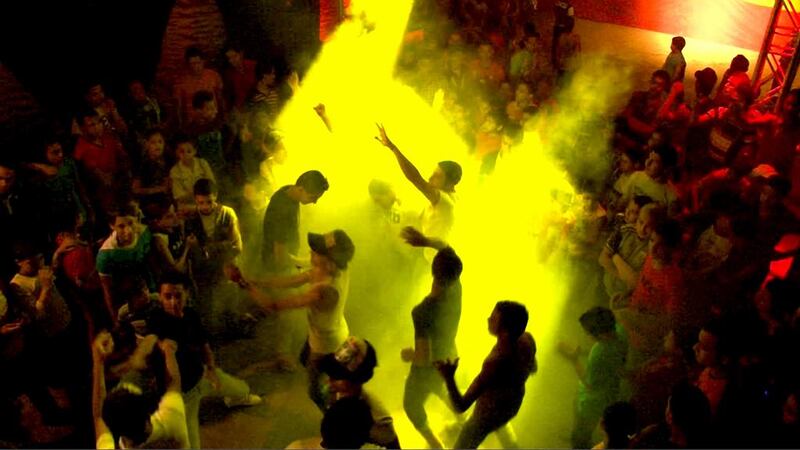A few years before the 2011 revolution, a riotous new style of dance music started brewing on the streets of Cairo's poorer neighbourhoods. At weddings, fast, loud, electronic music that fused techno and hip-hop with traditional styles started to replace the old bands and belly dancers, and a group of young people - mostly men - who made beats in their bedrooms and rapped about social change became local heroes. There's some dispute over terminology and subgenres, but it's generally known either as Mahraganat ("festival" music) or chaabi, a word which has the same root as "people".
A documentary film about this new hybrid form, Electro Chaabi, premiered at the London Film Festival last month before being screened in San Francisco, Switzerland and elsewhere. The director Hind Meddeb, a French journalist and filmmaker, says she stumbled on the scene when a friend showed her a YouTube clip of Islam Chipsy, an energetic, virtuoso keyboard player who often plays live with two drummers.
There was a phone number under the clip and when she called it, the drummer who answered thought she wanted to book the band for her wedding. Once they'd cleared up the confusion, Meddeb flew out to Cairo with her camera in March 2011 to document the movement.
"When you're with a musician," she says, "you hear about this party and then another one, until you know the whole scene."
The documentary shows artists including MC Sadat, Alaa Fifty, DJ Figo and Oka and Ortega rapping on rooftops, in cars, at home and at huge wedding parties, where hundreds of revellers dance wildly, climb on each other's shoulders and set off flares.
"It's a beautiful energy," Meddeb says. "The reason I did this movie is because we [in the West] always see Egypt and the Arab world as these veiled women and men with beards, and they're religious and they're conservative, but there's another side. Especially in Egypt, people love to party. They're into love, they're into life and they're very young. Like, 60 per cent of people are less than 30 years old and you feel it when you walk in the streets."
Chaabi songs talk about corruption, poverty and the failure of the revolution to improve their lives, but it's often done with a sense of humour. A well-known track by DJ Figo and Amr Haha is a wry twist on a revolutionary chant, called The People Want Five Pounds Phone Credit.
The scene is getting increasing media attention: the British music website The Quietus ran a six-part feature on the genre earlier this year and last year, an Arabic- language documentary called Underground/On the Surface was made by the Egyptian filmmaker Salma El Tarzi. Some of chaabi's biggest stars have made the move into the mainstream, with their music used in adverts for supermarkets and mobile phones. In Meddeb's opinion, they've started softening their message to appeal to their corporate sponsors.
Meanwhile, there's still a thriving underground scene, with artists who aren't afraid to speak their minds about politics and religion. At one point in Electro Chaabi, which includes scenes of protesters in Tahrir Square, Meddeb asks DJ Figo if the Muslim Brotherhood had ever tried to ban chaabi music. "No way," he says, with a laugh. "It would start a revolution."
artslife@thenational.ae
Follow us @LifeNationalUAE
Follow us on Facebook for discussions, entertainment, reviews, wellness and news.
Pulse of the people
A new documentary, about the Egyptian dance music that's lighting up Cairo's streets, follows a group of kids who become rap celebrities against a backdrop of political agitation and poverty.

More from The National









